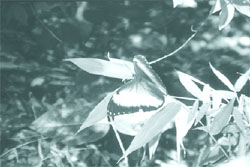Torn apart
 forest fragmentation, the world over, is associated with widespread animal extinction, loss of biodiversity and damage to the ecosystem. The two basic ways in which forest fragmentation affects natural biodiversity are, firstly, a reduction in net area of natural habitat available to the animals surviving in the patch. Secondly, in place of a single, large forest patch, a number of forest patches are created that are located at a distance from each other. This impedes movement of animals from one patch to another, thus affecting their normal activities. Disruption of forest continuity also reduces the chances of a patch being naturally restocked by animal movement from nearby more favourable areas. These were the findings of a team of biologists headed by John Terborgh of Duke University, Durham, North Carolina in usa , aided by students and scientists from Peru, Venezuela, India and Germany.The team, for the past many years, has studied the impacts of forest fragmentation in Lago Guri, the world's second-largest rainforest, located in eastern Venezuela.
forest fragmentation, the world over, is associated with widespread animal extinction, loss of biodiversity and damage to the ecosystem. The two basic ways in which forest fragmentation affects natural biodiversity are, firstly, a reduction in net area of natural habitat available to the animals surviving in the patch. Secondly, in place of a single, large forest patch, a number of forest patches are created that are located at a distance from each other. This impedes movement of animals from one patch to another, thus affecting their normal activities. Disruption of forest continuity also reduces the chances of a patch being naturally restocked by animal movement from nearby more favourable areas. These were the findings of a team of biologists headed by John Terborgh of Duke University, Durham, North Carolina in usa , aided by students and scientists from Peru, Venezuela, India and Germany.The team, for the past many years, has studied the impacts of forest fragmentation in Lago Guri, the world's second-largest rainforest, located in eastern Venezuela.
Initial survey done by the researchers indicated that most of the forested islands in Lago Guri were devoid of more than three-quarters of ther natural fauna such as jaguar, ocelot and puma, common butterflies,dung beetles, insect-eaters such as armadillos, and ant-eaters apart from several primate species. In the absence of much of the regional fauna, the densities of the few species surviving on small Lago Guri islands were found to be conspicuously more than that in the nearby mainland. For example, in the absence of the armadillos and army ants, densities of leaf-cutter ants on small islands had multiplied by almost 50 times compared to that in continuous forests. Further investigations confirmed that population explosions were the rule in the Lago Guri amongst herbivores that normally fall prey to jaguars, pumas and ocelots.
Specialised insects, such as fruit-feeding butterflies, were also highly vulnerable to extinction on the Lago Guri islands. For these mobile insects, that depend on just a few plant species for reproduction, survival on the island appears to depend almost totally on repeated colonization from the mainland. The species that were slow in colonizing as they cannot cross open patches between islands, lost their population on these islands. On the other hand, even species that could escape to these islands found it difficult to establish populations due to the rarity of the plants that their larvae feed on and the fruits that the adults depend on. Another group of specialised insects, the dung beetles, which require animal dung for survival, were also conspicuously absent from the Lago Guri islands because of lack of colonisation across the open water of the lake.
The researchers also came across an island surprisingly bereft of bird song. A large group of capuchin monkeys were the reason behind this unusual happening. These monkeys were stranded here during the inundation of the reservoir. Being
